Trying to make up your mind on what type of RV to get? We have had several and our favorite RV so far is our truck camper–here is why.
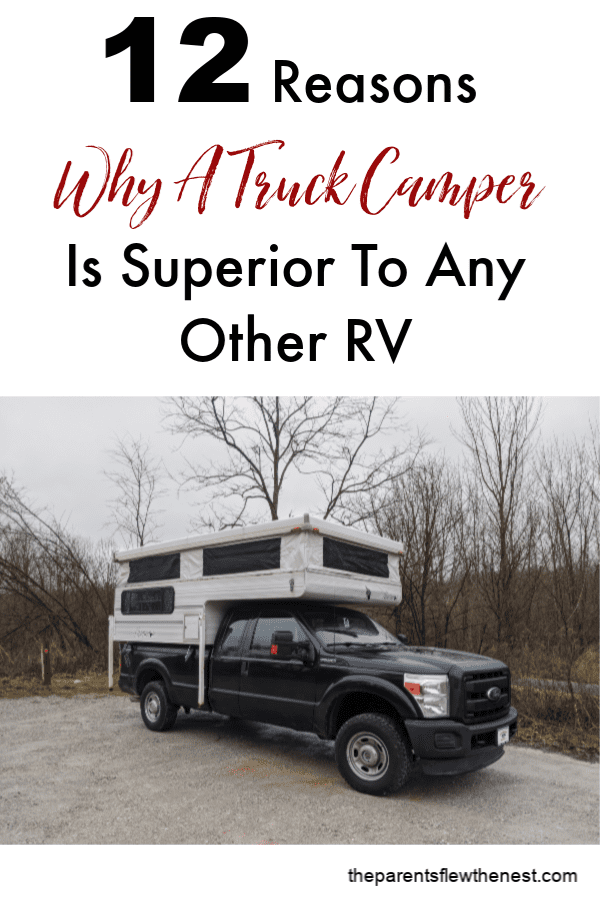
(Links in this post are affiliate links. I will be compensated when you make a purchase by clicking those links. See disclosure page for more information.)
My husband and I have owned various tents, two pop-ups, two travel trailers, a homemade minivan camper, and a DIY truck topper camper. Our newest camper purchase is a Northstar Pop-up slide-in truck camper and it is our favorite rig so far.
During our second outing with it, we started listing all the reasons why we loved it more than our other camping setups and then I thought, what a perfect way to tell blog readers why they too might want to purchase a truck camper instead of the other rigs and tents you can camp in.
12 Reasons Why A Truck Camper Is Superior To Any Other RV
Now keep in mind that other camping setups might check off a few items on this list too, but only a truck camper allows you to do all 12 things.
1. You Fit In A Regular Parking Spot
When we traveled for five and a half months with our three kids in a 27 1/2 foot Jayco travel trailer, we soon realized that a significant drawback of such an extended trailer is that it limits where you can park. For instance, on travel days, you can’t just swing through a drive-thru and order lunch for the family like you can on a road trip in the family van. You also don’t fit in the average fast-food parking lot.
With a truck camper, you might be too high for some drive-thrus with an overhang, but you still fit in their parking lots. You might not be able to park in the multi-level parking complexes, but you still fit in street parking spots.
2. You Can Cook A Meal Wherever You Are
In our DIY minivan camper, we had to cook our meals outdoors. We felt okay opening up the back and assembling a sandwich in the parking lot of the hiking trail, but other places it felt weird to make food. For instance, when campgrounds were full during a trip to Florida, we camped in a Walmart for a night. To us, it just felt wrong to set up a table and plop our Coleman camp stove on it and start cooking dinner in the parking lot (plus, I think it is frowned upon to do so).
In our Northstar, we have plenty of room and ventilation to use the indoor propane stove so we can cook without others watching. We have pulled over in a Walmart parking lot to make a hot dinner one night before pushing on to our final destination for the day. We have also assembled lunch in the parking lot of a crowded Kentucky park and made breakfast several times at a rest area. Every time we have done so, we haven’t felt the least bit self-conscious.
3. You Can Grab Warmer Or Cooler Clothes Whenever You Need To
When you drop your travel trailer off at the campground and then take off in your tow vehicle to explore the local area for the day, you have access only to what you pack in the tow vehicle for the day.
We were exploring Elizabethtown, KY in our truck camper on a day that went from hot to cold rather rapidly. I was getting chilled and you should have seen my face when I realized I could unlock the camper and jump in and change my outfit to suit the changing weather–total lightbulb moment.
4. Tired? Take A Nap Pretty Much Anywhere
On our date weekends, my hubby has one request–he wants a nap. On the other hand, I am not much of a napper, but knowing that our date weekend is a rare full weekend off work for my husband, I happily let the hardworking guy take a nap.
When we traveled with a travel trailer, we had to plan our day around his nap time. With the slide-in truck camper he can pop in the camper and take a nap whenever he has the urge. He doesn’t even need to put it up as there is a single bed on the main level and two windows he can open for ventilation.
While he naps, I am free to spend time in the local coffee shop, or explore one more hiking trail or read a book in the cab of the truck.
5. Much Easier To Take Advantage Of Free Campsites
We are glampers! We like to be warm when it is cold and cool when it is hot. We want access to a flushing toilet and a hot shower so we pay for campsites more than we take advantage of free ones.
But we both agree that when we leave town on a Friday night past dinner time with 6 hours or so to our destination, it makes more sense to camp somewhere for free whenever we get tired than to arrive at our destination at an hour where we would disturb others while we try to set up.
It is so much easier to do this with a truck camper as it takes seconds to set up and it fits in a regular parking spot. Plus, with it being on the back of our truck, we don’t have to worry about the conditions of the roads that go to free wilderness campsites like we did with a travel trailer.
6. You get Better Gas Mileage
When we pulled our travel trailer, we got 8 miles to the gallon with a 1500 GMC. We now own a Ford F250 and get 12 miles to a gallon when the truck camper is on the back. Yep, a bigger truck and we still get better gas mileage. Over time and miles traveled, the fuel savings will be significant.
7. Unplanned Stops Are More Doable
Spontaneity is especially tough with a trailer in tow. You can’t see something on a road sign and just turn off the highway and go for it. You have to check if they have parking for your tow vehicle and trailer and a place to turn around.
8. You Can Navigate The Smallest Of Gas Stations
I wish that I had known about the All-Stays app before we left on our journey across North America pulling a 28-foot trailer behind us–it would have made gas station stops a whole lot easier. The app shows you which gas stations are coming up so that you can see if you can last until the next larger gas station that is travel trailer friendly.
With our truck camper, we don’t use the app to pick out our gas stops; instead, we use it to find free places to camp. Why the change? We can now get in and out of any gas station with ease–especially since our truck camper is a pop-up.
9. It Doesn’t Have An Engine Or Tires
For a brief period of time, my husband and I did seriously consider purchasing a van that we can stand up in, gutting it, and then building it into a camper. But we soon realized that would mean we would have another engine to repair.
A truck camper has no engine and no tires. Tires are yet another expense that comes with both travel trailers and camper vans or Class As, Bs, and Cs.
10. It Doesn’t Require Extra Insurance (at least not where we live)
I was shocked when I found out this benefit because I thought for sure a slide-in camper would need to be insured and have vehicle registration (in some places it does).
Now, I am not an insurance expert so you need to consult your local insurance agent to see what the rules are in your state, but where we live no extra insurance or registration is required for a truck camper. The truck camper is covered by our home owner’s insurance when stored on our property and by our vehicle insurance when on the camper. We don’t take the camper off the truck when we get to the campsite; however, if you plan to take the truck camper off the truck while at the campsite, you might want to purchase a separate policy for it. At least that is what I interpreted the information that I read–again; I am unable to give insurance advice.
11. It Can Be Stored In A Smaller Space
We store our truck camper inside my husband’s workshop that has a garage door. Jack backs up the truck and sets down the slide-in camper for the next time we need it.
Our 28-foot trailer required us to give up a sizable portion of our backyard to create a parking space that could be accessed from the alley. It meant we had to spend a few weekends tearing up the grass, moving fence, and then laying down gravel.
If you live in a subdivision that doesn’t allow a travel trailer to sit in your driveway and you have a high enough garage door, you might be able to fit a truck camper in it and save yourself the bill of an RV storage facility.
12. You Can Tow Something Behind It
We have not done this, at least not yet, but a truck camper uses your vehicle’s haul weight, which does not affect the towing capacity. What that means is if you own a fishing boat, you can have a truck camper on the back of your truck and tow the boat on a trailer behind you (you do need to check the haul and towing capacity of your truck before you do this).
You could tow other items too–like an ATV, a canoe trailer with canoes, or Kayaks. If you wanted to, you could even pull a travel trailer or pop up behind you–although why?
If you get a travel trailer, you can put things in the back of your truck up to the weight of your vehicle haul capacity, but a truck bed isn’t big enough for a lot of outdoor items like fishing boats.
The Top 4 Big Reasons Not To Buy A Truck Camper
I don’t believe that any purchase comes without its cons and I would feel like I was not entirely honest about truck campers if I didn’t share a few things that might make them not for you and your family.
1. Most Don’t Sleep More Than Three People Comfortably
Except for the biggest models, most truck campers have a queen bed in the loft area and a dinette that makes into a twin bed or a Jackknife couch that is just wider than a twin. If you are a family of larger than three, a truck camper probably isn’t for you.
2. You Have To Have A Bigger Truck
We first started looking at slide-in truck campers when we had a GMC 1500 Sierra and were shocked that even the lightweight truck camper models were over the hauling capacity of the truck. This is why we made our own truck topper camper in the GMC, which we used until the truck died.
When we replaced the truck, we knew we needed one with a hauling capacity of close to 3,000 pounds to be able to get the style of truck camper we wanted and to pack along what we like to pack. That meant we needed a Ford F250 or similar truck.
A bigger truck costs more to purchase and offers lower gas milage. If you don’t have a use for a larger vehicle besides hauling or towing a trailer, you might want to look into a lightweight pop up camping trailer which can be towed by a minivan or small SUV.
3. Only The Biggest Models Have Indoor Showers And Traditional Flush Style Toilets
This, to me, is the biggest drawback of getting a smaller pop-up style slide-in truck camper. My husband’s brother and sister-in-law just bought a larger truck camper with a traditional style roof and they have a wet bath that I am envious of. However, to safely haul such a trailer, we would have had to go with an F350 and we decided it just wasn’t worth the extra purchase cost and fuel cost for the one weekend a month of camping we average.
4. It Does Take Practice To Get Them On An Off Your Truck Safely
Truck campers have a post on each corner that can be cranked up and down to allow the camper to be put on your truck with ease. Well, not ease, the clearance between the exterior of your truck bed and the posts is extremely minimal, meaning you have to be a pro at backing up straight into tight spaces to get a truck camper on and off.
Then there is the issue of it shifting while you are driving if it isn’t properly tied down to your truck. The first time we took ours out, the bolting system we used had a bit of play; we thought that was okay–it wasn’t. The camper slid back a foot in the bed of the truck when we went up a steep hill. Thankfully it only slid that one foot and we were able to pull over soon and put an end to the problem.
Even With Their List Of Cons, I Think Truck Campers Rock For Couples
When we camped with three children, truck campers were not an option–they were too small. But now that we are a camping couple a truck camper rocks. I would recommend a truck camper over any other style of RV to couples young and old who want to get out and explore on weekends.
Ours has taken us so many places we could never take our travel trailer and we have only owned it a few short months.
Can’t afford a slide-in truck camper, but you already own a truck and topper?
Are you looking for an alternative to busy and expensive campgrounds and one-night Walmart stops on the way to your destination? Check out our post about our first time using Boondockers Welcome.
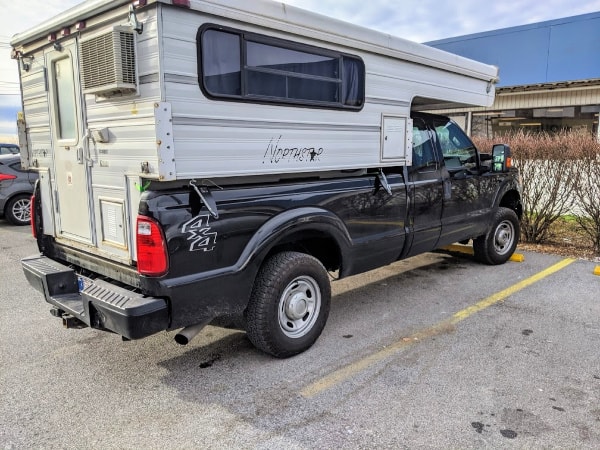
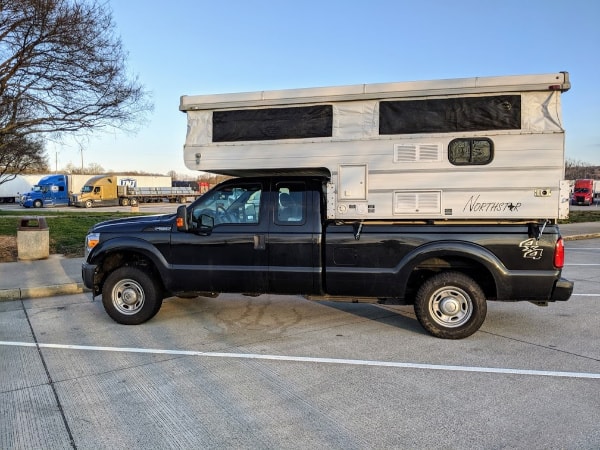
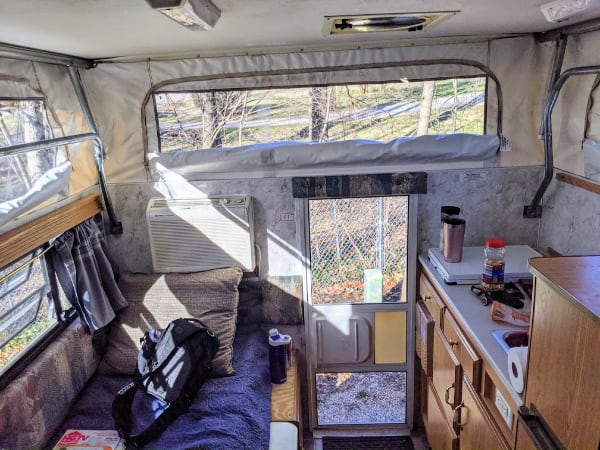
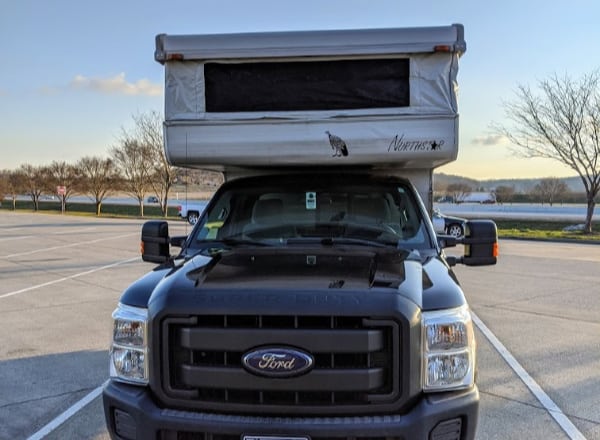
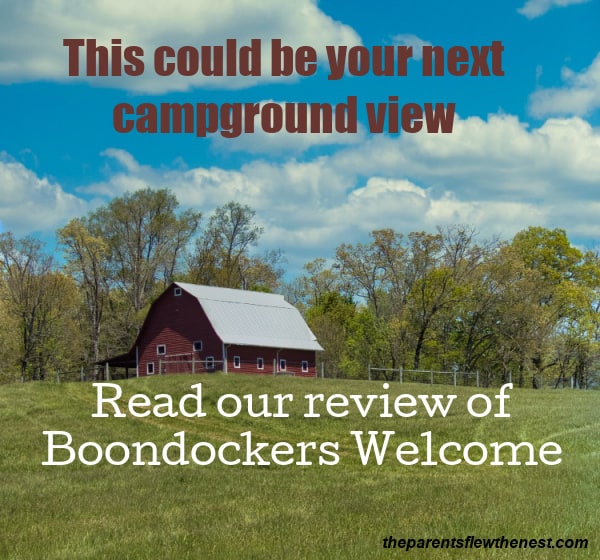
I have had a Dodge Van with a large U shaped dinette that makes into a bed, then Dynacruiser 11 1/2 ‘ Truck camper, then different trailers, Motorhomes, and finally a 34’ 5th wheel with a big corner kitchen, fireplace, washer/dryer unit and very comfortable big couch and 2 recliners. Now I’m planning to buy land that has power, water, and septic..hook up my 5th wheel. AND looking for a big used camper..MUCH EASIER TO PARK !!
In the last 50 years I’ve had a Van, Trailer, Motorhome, and now a 34′ 5th wheel..Looking for land to park my 5th AND NOW looking for a big Used Truck Camper. Much easier to park !!!! 😁
Good luck with your search! Happy exploring!
Yes. We had 3 campers and then we thought a class c would be nicer and got one a 32 footer was nice but started to find out we can’t do this and that that a camper can do only thing nice about the motor home is u can get up and go pee or make lunch while in motion and that just all then we sold it and went back to campers. Went thru 2 more campers. And will keep doing campers until we die
Truck camper, You can take your 4 wheel drive and make dinner on top of a mountain.
That is another great benefit! We are looking forward to doing some off-roading adventures with it eventually.
Almost all the advantages are as compared to a travel trailer. A small motorhome has nearlty all the same advantages and several additional advantages not mentioned. A class B is even better in most respects. It’s much easier to just take a nap or prepare a meal versus a truck camper. To each his own I suppose.
That is right, it all depends on what you want to do with the RV. They are not all made for the same purpose and there is no reason to make them all fit the same purpose.
As much as I like some of the better made class C’s & A’s, when it comes to maintenance costs, truck campers are the champ. As pretty as some of the ‘Class’ RVs are, just getting them serviced is a major hassle, even trying to find a “nearby” auto shop willing to take them becomes a laborious quest. That’s true even for Class B’s. Truck campers however don’t have this problem.
Hi!
Thanks for a great article. One issue though. All trucks have a GCWR (Gross Combination Weight Rating) which dictates how much total the truck can weigh and tow. When you have a camper adding to the weight to the truck, it reduces the weight that can be towed. Usually, if a camper weighs anywhere near the Payload Capacity of a truck, towing capacity will be small.
Thanks for clarifying this.
I had truck camper,pop up,l just loved it .went out to sturgis bike rally and pulled two harley in a box trailer.watched people riding in rain,I drove,ate drank lesson to music, in ac…..so cool…
The one thing that can help is to not get a diesel and stick with gas. The diesel weigh’s almost 1000lbs more than gas. Just an idea.
Can’t you buy something like Timbrens Or air bags etc. to be able to tow over 5000 payload with your F150 Ford truck?
Cummims Diesel with the 6 speed transmission will out perform any gas motor in torque, which is what you need, with uncompromising fuel economy. I have a question foot Lance sitting on a2001 ram 2500 Cummins nv5600 6 speed. Billet suspension. Air bags. Billet motor and tranny. I get w2 mpg with my camper pulling a 21 foot Crestline Nordic.
I’ll take diesel power over gas anyway. Especially in the mountains.
No you should not exceed the weight limit of the vehicle. Even with air bags. I have 5,000 bags on my 3/4 ton dodge diesel. The problem with ecceeding the weight limit of the truck, its not damaging the truck. Bit if you get into an accident with an overloaded vehicle, you will get fined
That the problem with airbags.
Air bags certainly help support over loaded springs which can improve some safety or drivability issues but they don’t upgrade your brakes or axles so they don’t really upgrade max total tow or load capability
Recently talked to salesman who sold me 2012 f150 5.0l fx2 extended cab, explained to me all i really need is too add a few more leaf springs to my truck and forget about shocks. Thinking of purchasing a four wheel camper model grandby. Dry weight of grandby is 1100lbs & my vehicle payload sticker is 1554lbs. This summer will weigh my vehicle at a cat weigh station than do the calculations from there.
Won’t passeningers and supplies easily take you pass the limit of your truck?
Timbrens,air bags etc stiffen the suspension so your truck doesn’t “squat” when loaded. There is no way to increase the payload capacity . Typical payload of a F150 is 1200 to 2200 lbs depending on engine, cab,bed and options.
No. Adding air bags does NOT increase your payload.
I’m looking into getting a truck bed camper and this is incredibly useful information! Thank you for posting it.
You are welcome.
I totally agree with your comments. We have a class b rv and that also parks everywhere and pretty easy to maneuver too. Plus your inside all the time which is nice during inclement weather
Yes! My husband and I discovered the downside of having to go out of the truck to enter the slide-in camper on our last trip during a heavy rainfall where we were super hungry and all the food was in the camper.
I’m in the process (almost done) of building my dream truck (Dodge Ram 3500 Megacab with 12 valve Cummins and 6sp transmission) and I’m planning on getting a slide in camper to put on top of the 8′ dually aluminum utility bed that I’m putting on it. I’d love to find a pop up with solid walls, I know that there’s some out there but I’m sure they are hard to come by 😬
They are a dime a dozen. Check out Facebook market. Lots of good deals to be had
Alaskan makes wonderful hard sided pop-up campers! Our family has had one for years and we love it. We have also had a traditional slide in pickup bed camper, 2 class B motorhomes, a class A motorhome and a 28 ft bumper pull camper. They all have good points and not so good points depending on what they’re being used for.
My wife and I are in similar situation as you are, we have two girls 19yrs & 21yrs old now. So we are looking to turn this Truck Shell into a camper for weekending trips. She also wants to take a longer multi-week trip out West next summer/fall.
I have enjoyed reading your adventure blogs. I started with your Truck Shell Camper build, as I have been looking for ideas on how to build-out my own truck shell I just purchased. I have a 2002 Chevy Silverado w/ a 6′ 6″ bed. I picked up a used Topper Shell w/ a high roof back (Cool). And I’m pretty stoked that I only paid $300.
I’ve been doing a lot of research, trying to find the best options for building out the bed foundation. We received a free queen mattress from a friend who purchased a new Travel Trailer and didn’t like the mattress that came with their camper, so they purchased a new one gave us the other. Also looking for the right storage solutions, kitchen essentials, toileting and showering (when needed). My hope is that she likes this type of camping so we can do more. The “Thriftiness” of this type of camping appeals to me A LOT. Now we just need to build it, test it, and run thru the paces.
Thanks for your insight into your adventures. They have been good to read. Take care and be safe on the road.
Thanks for the very useful information. It helps me to make my Decision. I am going to get a pop up camer.
I ordered gmc 2500hd gas engine first and changed mind to diesel engine ordered
because fuel cost
much less even engine weight 1000
pound.
Estimated gas engine about
10 miles per gallon
diesel engine is 15.9 city, 20 miles per gallon.
01 Cummins 24v. Nv5600 6 speed
24mpg with camper and boat
27 might empty.
For Truck use Slide in pop up camper.
I have owned seven truck campers over 47 years. I have also tent camped, owned several travel trailers, and two 5th wheels. My deceased wife and returned to a TC from a 36 foot 5th wheel a couple of years before she passed. My current wife and I currently enjoy an 11 foot fully self contained hard sided camper that we haul on an F 350 crewcab dually 4×4 with diesel power. Although it’s a larger camper with all of the bells and whistles, it seems small to us. I bought it as a widower, and my current wife was new to RV”s when we got together. She is learning the importance of organization in such a compact space, and is really enjoying the camper, so much so that she will suggest that we sleep in the unit some during the winter when it’s stored in our garage. Since our unit has both electric and gas powered appliances, it’s possible to safely use while inside a closed building. I choose a large camper without slide outs for multiple reasons. To build a slide out the camper must start with a giant hole in the side of it. If one looks at used campers with slide outs water damage and stress cracks are common. A slide out increases weight significantly. Our 2800 lb dry weight camper quickly becomes a 4000 lb camper loaded. A 4000 lb camper maxes out most trucks, even a one ton dually! A camper with slide outs has more floor space, but less storage space then the same model without slides. A camper with slide outs is usually poorly balanced. Many campers with slideouts require the slides to be extended to enter the camper. Since I am going to own an F 350 regardless, a TC makes sense to me. We have a medium sized RV with diesel power and 4×4 capabilities. Compared to a motorhome, it means one less engine to maintain. We also combine boating with camping. Our F 350 gives us the ability to tow a large boat behind. Our 11 foot camper requires a hitch extension of 48 inches. I recommend the Torklift Super Hitch and Super Truss extension. This unit is capable of safely towing 6K without load equalizers and 12K with load equalizers.
Thank you! I read a lot of articles related to camping. I own a small 1996 Northern Lite for about 5 years. I love it! I have it over a 2011 F-150 and it is great for me. I have everything except an inside shower. I have been towing with the idea of buying one with a shower inside. But your article helped me realize that being alone and loving what I have is all I need . I. Just wish things go back to normal so I can travel. Thank you!
Just about to embark on adventuring with my new partner and a truck camper here in Australia. After having owned a motorhome in Europe and previously caravan, camper trailer and 6×6 motorhome here I have after careful research purchased a truck camper and small AWD commercial truck to mount it on. The ISUZU NLS AWD drives on a car license and fits into a car parking bay yet can carry 2 ton and tow up to 4.5 ton though 3.5 ton with regular equipment.
My truck camper is hard walled with shower toilet, dinette, kitchen and permanent overcab large bed. I had intended just to travel with and in my large trailable yacht ( both land and water) but this arrangement will be more comfortable, more flexible (inland and off bitumen as well) and still allow us to take the yacht for some extended sailing adventures as well. My research led me to a small commercial vehicle as our generally smaller tradesman trucks here in Aus are often illegally and dangerously overloaded attempting this same kind of feat. Wish me luck!
Hi, everyone. I have a 2012 Toyota Tundra , 150,000kms on it. It has carried a pop up camper for 10 years. I wonder how many more years the truck can be used without having big problems, such as leaving us in the woods waiting for help. Thanks.
I am by no means a truck expert, so others who know more about trucks please chime in. However, we owned a Toyota before and it had 350,000 kms on it and it was still running.
Hi, great article. I’m interested in purchasing a pop up TC. We have a RAM150. Gas mileage is 15-18mpg. It does make me nervous to think I’d go down to 10-12mpg with a camper on top. I also want to be able to carry 2 kayaks…on top. I’m just wondering if a pop up TC is the right way to go. It would cost a fortune in gas. Do you ever take the camper out by yourself? I would be interested at times to going alone and wonder if I could handle driving it and setting it up.
Hi Terri, I (Victoria) haven’t taken out the pop-up truck camper by myself but I do have plans to take it out with my college-age daughter this spring. They are very simple to put up and down so I feel confident I could do that by myself. I have also driven the truck with the camper on it, and it seriously felt exactly the same as when it doesn’t have it on it. As for carrying the 2 kayaks, I don’t know if the roof of ours could take that, but I have seen them mounted on the sides of a pop-up truck camper before.
…we love our Jayco 7lp Sportster…with a small AC unit, a 2000w inverter generator on the back, 200 watts of solar on the roof…we are ready to go anywhere the Mighty Dodge 4×4 can go…and we can camp comfortably!
If you follow the Morton’s on the move, Go North series on YouTube, touring Alaska was the ultimate way to Boondock. My wife and I are planning to do the same with our Lance 1172, Ford F350 dually diesel.
I followed all their posts on Alaska. Hoping to get there one some too.
I have had two truck campers and love them especially when I am pulling my bass boat tournament to tournament
Everything you say is true, truck campers are great. But to carry a twelve footer you need an 8 ft bed and dual wheels. To avoid that I bought a motorhome which is basically the same, right? Wrong. After one trip I hurried to get rid of it. Driving down a highway I found out how terrible our roads are. With 70 pounds of air in the tires and extra hard springs it was like driving with wooden wheels. I now have 36 ft fifth wheel with all the cons you mention. We like the comfort of interior size, but hate the bother of exterior size. I see a 12 ft truck camper in our future, as soon as I can afford an F350 with dual wheels.
I have an older 9′ hardtop (& about the same vintage truck so looks perfect) for traveling by myself to car events. It’s the shortest one I’ve seen w/a full wet bath but can still tow a trailer w/an extended tongue w/o a hitch extension (they tremendously reduce tongue weight capacity). I just need to add a roof A/C (it was factory pre-wired) and it’ll be perfect. Truck Campers are the by far the most versatile campers.
We found out last summer that AAA does not cover a camper without a rider. Our truck lost an alternator. AAA said they would tow the truck to town but we would have to leave the camper on a remote mountain pass.
So just keep that in mind while campering.
Thanks for the great article. I have been consumed by the TC vs trailer vs RV vs DIY school or shuttle bus build and I think I’ve come to basically the same conclusion you did in the last 10 mins of reading.. I have a F-150 Crew cab(4 door, short bed) are there any particular models you’d feel comfortable steering me towards without upsizing my truck? My budget dictates that I will be looking for the best deal possible on a used but serviceable TC.. I should add that I will be towing my small BMW F-650 to tool around on once I reach my destinations and it’s only gonna be me for now unless I can also get a good used but serviceable Pug or something like it at a shelter along the way, lol…
Any tips would be appreciated…
The good thing is you have a Ford and they tend to have pretty good haul capacities. I would suggest going to a Ford dealership and asking them to look up the tow and haul capacity of your particular truck that will give you a better idea of how heavy of a truck camper you can purchase. Pop-ups tend to be the lightest and 4 wheel campers make ones for short bed trucks. I think Palomino does too.